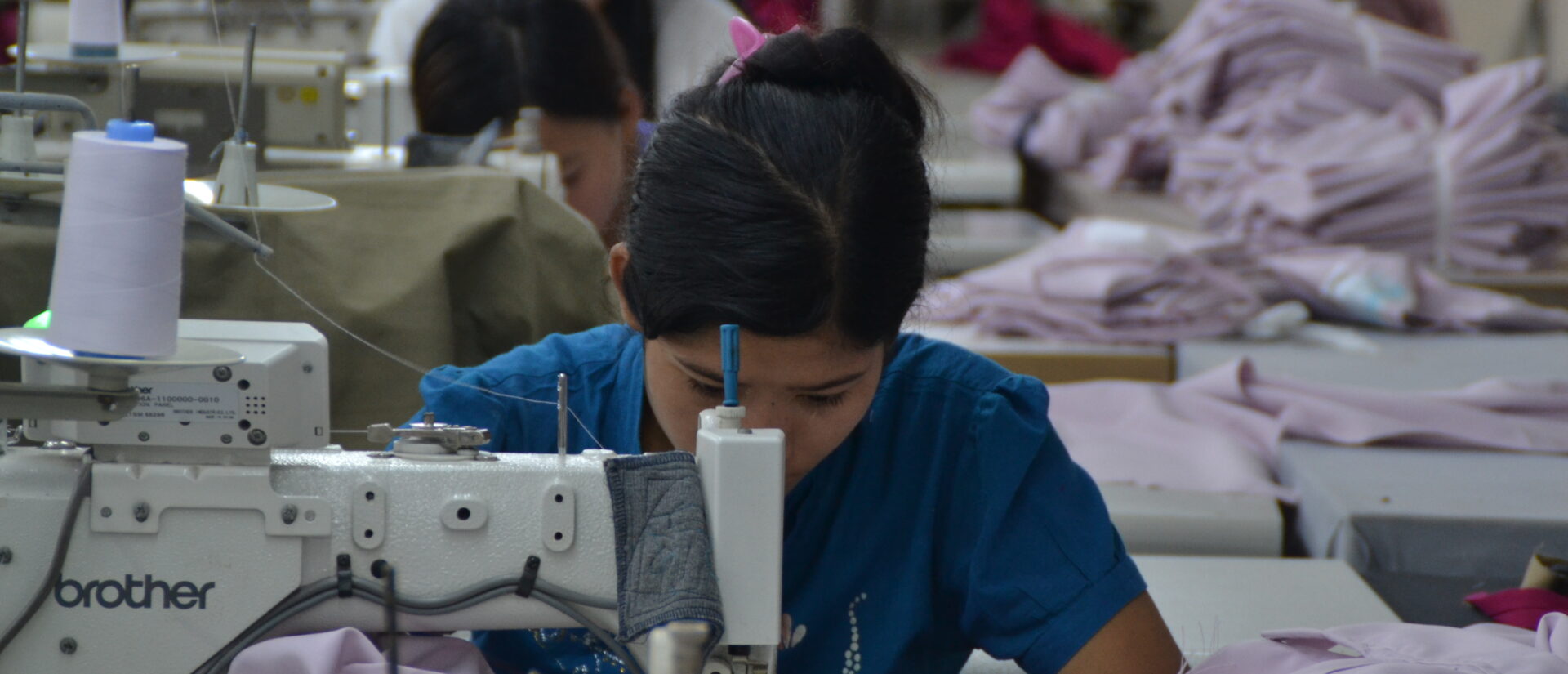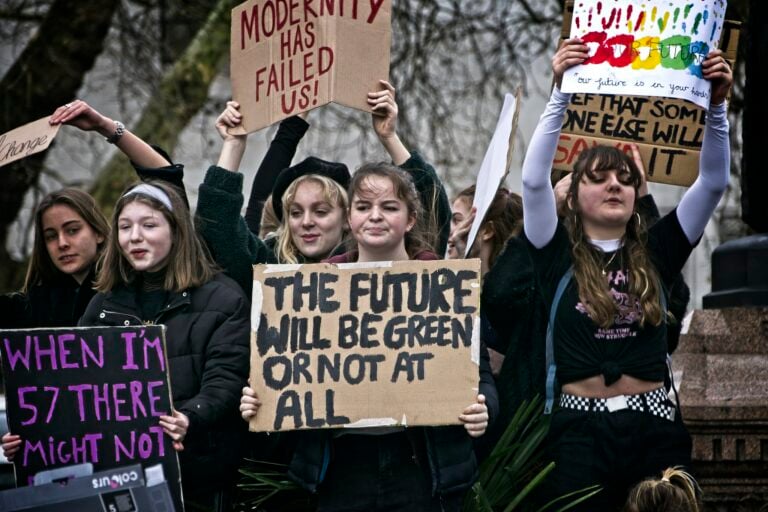
Dutch Agreement on Sustainable Garments and Textile offers little benefit to garment workers
The Dutch Agreement on Sustainable Garments and Textile(opens in new window) published its first annual report on 18 December 2017. It shows that the majority of participating businesses do not know what the risks are in their supply chains and have no plan of action to address abuses. Furthermore, it is still unclear where brands have their clothing manufactured and which concrete solutions they propose. There are 2,802 factories that fall under the agreement, but up till now only six abuses have been reported, and it is unclear whether these problems have been solved. The Netherlands Clean Clothes Campaign(opens in new window) (SKC) and the Centre for Research on Multinational Corporations (SOMO) conclude that there is still no sign of any substantial improvements for garment workers.
The aim of the agreement is to address and prevent abuses – such as life-threatening working conditions, child labour and modern slavery. This is essential because these kinds of appalling conditions are rampant throughout the entire clothing supply chain. The participating businesses must identify the human rights risks in their supply chains and develop action plans to address these risks. The Agreement on Sustainable Garments and Textiles has now published its first annual report(opens in new window) , which includes the results of these efforts.
Eighty per cent do not know which abuses take place
Company self-evaluations showed that only 17 per cent of businesses had sufficiently investigated risks in their own supply chains. Furthermore, only 18 per cent of the companies have a plan of action to address risks in their supply chain. This means that more than 80 per cent of clothing brands which have signed the agreement do not know if abuses take place in their supplier factories and have no plans to address these abuses. SOMO and SKC find this number shockingly low.
Six abuses reported, one problem solved
A total of 2,802 factories fall under the agreement. Six abuses in these factories were reported to the agreement’s secretariat. It is unclear whether these abuses were resolved and if so, how. Not a single complaint was reported by a garment worker. That might seem positive, but the lack of complaints does not mean that there are no problems. Until now, information on the complaint procedure has only been available in Dutch or in English.
“Information on the complaint procedure should be available in the local language and in every factory. A trusted person in the production country should deal with the complaint. It is unrealistic to think that garment workers would be able to call the secretariat on their own“, stated Tara Scally, spokesperson for SKC. “The Bangladesh Accord on Fire and Building Safety identified and resolved thousands of problems. That agreement was aimed at a single country and a single labour standard. How can it be that a covenant that covers more countries and more CSR (corporate social responsibility) aspects would encounter fewer problems?“
Lack of transparency
From the outset, SKC and SOMO have been critical about the lack of transparency in the agreement. This annual report provides little information on how the secretariat has evaluated the risk analyses and plans for improvement. There is no independent evaluation or verification by garment workers or labour rights organisations. The report discloses no information on which risks have been identified, what the companies’ priorities are or what the improvement plans contain, not even on the ‘aggregated level’. Tara Scally:
“Based on this publication, the consumer still does not know which clothing brands have plans to improve conditions in their factories, even though the covenant states that it wants to serve the consumer“.
Roadmap to living wage promised
In early 2017, the former Dutch Minister for Foreign Trade and Development Cooperation, Lilianne Ploumen, promised to develop a roadmap to achieve a living wage, jointly with businesses. She had made this promise in response to an investigation by SKC and the India Committee of the Netherlands. But this annual report includes no plan of action for raising the wages of workers. Spokesperson Tara Scally:
“Last week the Clean Clothes Campaign released a publication that showed that many Eastern European workers are living below the poverty threshold. Research in India showed that workers earn less than the minimum wage. Even the 80 per cent of companies that have no idea of the risks in their supply chain should know by now that higher wages are urgently needed”.
Region-specific approach for Europe, Myanmar and Bangladesh
The annual report presents information about production countries, but it does not give information about which brands are active in which countries and what their specific approaches are in those countries. Romania and Poland are in the top ten sourcing countries for signatory companies. These countries are highlighted in the recent Clean Clothes Campaign publication ‘Made in Europe(opens in new window) ’. This publication shows that exploitation also takes place close to home.
Bangladesh also figures in the top ten production countries of the agreement. After the collapse of the Rana Plaza factory in Bangladesh, the Bangladesh Accord on Fire and Building Safety was established with the objective of preventing and reducing the number of factory accidents. Tara Scally:
“The Bangladesh Accord solved thousands of problems and progress can be followed online. It should be a requirement for signatories of the Dutch agreement to sign up to this proven, effective system, but it isn’t. Up till now, only a few signatories have joined on their own initiative“.
Myanmar is an emerging production country. Low wages and favourable trade conditions are attracting garment manufacturing to this fragile democracy. Investigation by SOMO revealed considerable risks in this country: from absurdly low wages to forced overtime work to child labour. The risks are not limited to the work floor; factory buildings might be owned by the military and ex-military, and factories may have been built on land that was confiscated from peasants during the military dictatorship, without paying any compensation. Martje Theuws, SOMO researcher:
“It is unclear which companies that are signatories to the agreement operate in Myanmar and what they are doing to address human rights risks“.
Legislation is needed
SKC and SOMO believe that the government must develop legislation in the areas of mandatory human rights due diligence and transparency (publication of production locations and public due diligence reports). These are required conditions to achieve improvement. Legislation will also ensure a level playing field between the participants of the agreement (who are already expected to take steps in these areas) and companies that are not part of the agreement.
Related news
-
Linking labour issues in China to global brands Published on:Posted in category:Publication

-
Chain of consequences Published on:
 Joshua RosenzweigPosted in category:Publication
Joshua RosenzweigPosted in category:Publication Joshua Rosenzweig
Joshua Rosenzweig
-



